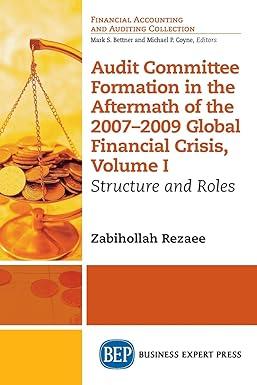Question
The question as to whether a Worker was an employee or an independent contractor has been litigated before Canadian Courts on many occasions. Some of
The question as to whether a Worker was an employee or an independent contractor has been litigated before Canadian Courts on many occasions. Some of the leading cases in this area are Wiebe Door Services Ltd. v. M.N.R., 87 DTC 5025 (FCA), 671122 Ontario Ltd. v. Sagaz Industries Canada Inc., 2001 SCC 59 (CanLII), [2001] S.C.J. No. 61 and Royal Winnipeg Ballet v. Canada, [2006] FCA 87. The common law test is whether the Worker is engaged in performing services in business for herself (an independent contractor) or is under the control and direction of the hiring organization (an employee). To answer this question, the court considers a number of factors:
(a) control; (b) ownership of tools; (c) chance of profit; (d) risk of loss; (e) integration; (f) intentions of the parties
The Scenario
An Accountant is offered a job with start-up tech company called Hubba on the following terms:
- 1 year fixed-term part-time contract, with possibility of renewal
- 25 hours per week at a rate of $50/hour
- Paid monthly
- Report to CFO and perform duties as required by CFO
- Worker is required to attend finance/accounting department meetings
- Duties include: prepare and review financial records, annual filings, and grant reports, conduct internal audits, implement accounting policies, processes and systems and provide
financial/tax advice
- Contract terms:
o Contract does not stipulate that Worker has to exclusively work for Hubba (note: Worker does not have any other clients)
o Contract does not stipulate whether Worker is employee or independent contractor o Worker entitled to 3 weeks unpaid vacation o Worker is not reimbursed for expenses o Worker is not entitled to health/dental/parental benefits
o Worker provided company laptop, cell phone, email, business card and office o Worker required to supply accounting software and other resources, materials to
perform job o Worker entitled to work remotely provided that it attends the office one day per
week and submits weekly reports o Worker subject to restrictive confidentiality covenants
Question 1
Is the Accountant more likely to be classified as an employee or independent contractor of Hubba? Apply the facts to the legal test set out above (analyze the six factors).
Question 2
What are 2 advantages and 2 disadvantages associated with the classification of an independent contractor?
Question 3
If you are the Accountant, and Hubba asks for your input, what status do you prefer employee or independent contractor? Explain.
Question 4
What are some legal consequences Hubba could face if it misclassifies the Accountant and treats it as an independent contractor when it should have been treated as an employee?
Step by Step Solution
There are 3 Steps involved in it
Step: 1

Get Instant Access to Expert-Tailored Solutions
See step-by-step solutions with expert insights and AI powered tools for academic success
Step: 2

Step: 3

Ace Your Homework with AI
Get the answers you need in no time with our AI-driven, step-by-step assistance
Get Started


